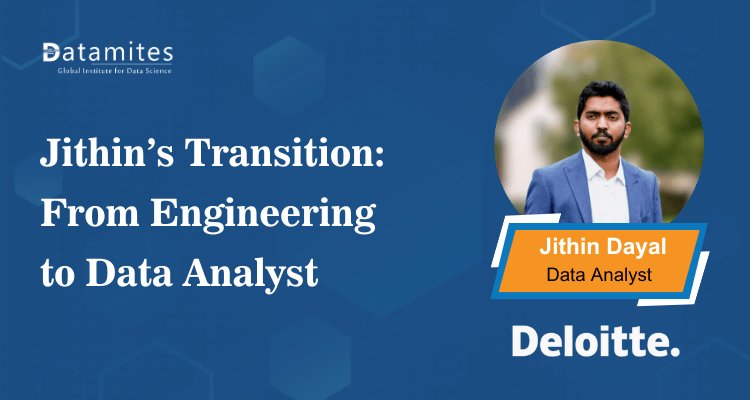Jithin’s Transition: From Engineering to Data Analyst
Discover how Jithin Dalal transitioned from a mechanical engineer to a Data Analyst at Deloitte with guidance from DataMites Institute. Learn about his challenges, resume tips, key skills, and how a strong GitHub portfolio and communication shaped his data career. A must-read for aspiring analysts!

In today’s data-driven world, analytics has become the backbone of informed decision-making, transforming raw information into powerful insights that drive business success and innovation. Today we are joined by Jithin Dalal, who is here to share his inspiring journey of transitioning from a mechanical engineer to a Data Analyst at Deloitte. His story is a testament to how embracing new opportunities, learning new skills, and taking bold steps can lead to a rewarding career. Let’s dive into his journey, the challenges he faced, and the pivotal moments that shaped his career.
Jithin's Journey with Datamites: Engineer to Data Analyst
Jithin's journey from mechanical engineering to data analytics is a story of transformation and determination. In this article, he shares his experiences, challenges, and the pivotal moments that shaped his successful career as a Data Analyst.
Q1 : Hi Jithin, Could you share a bit about your background and how you transitioned into this field?
A: Jithin, originally a mechanical engineer, transitioned into data analytics after the pandemic by enrolling in Datamites for Data Science course. The training provided a solid foundation in Python, data visualization, and analytics tools, along with hands-on project experience.
This practical knowledge was crucial when he pursued a Master's in Computer Science in the UK in 2022. Despite the competitive job market, Jithin's experience with tools like Jupyter Notebook, learned through Datamites client projects, helped him stand out. After months of job searching, he refined his strategy and resume, realizing the importance of showcasing practical skills to prospective employers.
Q2 : What advice do you have for creating a data analyst resume?
A: Your resume is crucial. Recruiters often spend very little time initially reviewing it – maybe 10-15 seconds. So, you need to catch their eye immediately. Focus on these key aspects:
- Keywords: Tailor your resume to each job description. Identify the keywords they are looking for and embed them naturally, especially in the first paragraph of your summary.
- Skills First: Place your technical and soft skills prominently on the first page, right after your summary.
- Experience Next: Detail your relevant work experience and projects, highlighting your accomplishments and the tools you used.
- Education Second: Include your educational background and any relevant certifications.
- Projects: Showcase your data science and analytics projects, ideally with links to your GitHub or Kaggle profiles. Describe them like a story, emphasizing your approach and findings.
I spent many nights editing my resume for different roles. It's tiring, but essential. Also, remember to keep your online profiles like GitHub updated. I had a GitHub from my Datamites days that I hadn't actively maintained, but it turned out to be a key factor in my interview.
Q3 : Tell us about your interview experience for your current Data Analyst role.
A: The interview process was comprehensive, starting with a screening round followed by logical, behavioral, and technical assessments. The logical rounds tested problem-solving with Python, SQL, and Tableau, along with data visualization techniques. The technical round focused on scenario-based questions and my GitHub portfolio, where they reviewed my code and approach to problem-solving.
They appreciated that my past work closely aligned with the role, reducing my training time. The interviewers also stressed the STAR technique (Situation, Task, Action, Result) for behavioral questions, aiming to assess my problem-solving, teamwork, communication, and ability to handle challenging situations.
Q4 : What skills do you think are most important for aspiring Data Analysts?
A: While technical skills are essential, communication is paramount. You might have strong technical abilities, but if you can't clearly communicate your findings and problems, it hinders your effectiveness. Teamwork is also crucial. From my interview experiences, I've learned that being able to break down problems, articulate your approach, and even ask for help effectively are highly valued. Don't be afraid to admit when you don't know something, but show your willingness to learn and collaborate.
Q5 : What triggered your interest in data analytics, coming from a mechanical engineering background?
A: Even in my mechanical engineering role, I was involved in data operations. I was always curious about what happened behind the scenes – the "magic" as I called it then – when data was processed to provide insights. When the pandemic hit, I had the time to explore this curiosity further. My cousin, who transitioned from mechanical engineering to data science, encouraged me and suggested Datamites. That's where my formal journey into data began.
Q6 : What were some of the challenges you faced during your transition?
A: The transition wasn't overnight. My previous experience in report writing was helpful. Datamites Institute provided a structured roadmap, which made the learning process feel manageable. The collaborative environment with my project team also made a big difference. It's about a gradual build-up of knowledge and skills.
Q7 : How important do you think statistics is for a Data Analyst? Were there any statistics-related questions in your interviews?
A: Statistics is definitely important. While my current interview didn't heavily focus on it, many others do. You might encounter mental ability tests covering basic math and statistical concepts. Even seemingly simple concepts like mean, median, and mode are fundamental in data analysis. Understanding standard deviation and data distribution is also crucial for drawing meaningful insights. While you don't need to memorize every formula, knowing how and when to apply statistical methods is key.
Read the articles:
- From Mechanical Engineering to Data Analyst: Guruprasad’s Journey
- Switching Tracks: Abrar’s Mechanical Mind to Data Pro
- From Roots in Biology to Rising in Data Analytics: Poojitha’s Journey
Q8 : Any final advice for those looking to enter the field of data analytics?
A: Practice consistently. The more you work with data and solve problems, the better you'll become. Focus on building a strong portfolio of projects that showcase your skills. Network with people in the field. And most importantly, develop your communication and presentation skills – they are just as vital as your technical abilities.
Q9 : What steps should I take to build a strong career in data science and analysis during my pre-final year?
Answer:
Build a Portfolio: Work on real-world data science projects and showcase them on GitHub.
- Network: Connect with professionals on LinkedIn and attend industry events.
- Tailor Your Resume: Customize your resume for each internship/job application.
- Seek Internships: Apply for data-related internships for hands-on experience.
- Practice Skills: Keep honing your Python, SQL, and data visualization skills.
- Develop Soft Skills: Improve communication, problem-solving, and teamwork.
- Prepare for Interviews: Practice answering technical and behavioral questions.
- Consider Certifications: Enhance your profile with additional certifications in data science.
Q10 : How can I explore opportunities in data science and analytics beyond tech companies?
Answer:
- Explore Various Industries: Look for opportunities in finance, healthcare, retail, and manufacturing.
- Check Career Pages: Visit company career pages for openings.
- Broaden Your Search: Apply to companies outside of tech that need data professionals.
- Stay Informed: Keep learning how data science is used in various industries.
Highlights from Jithin's Journey:
Jithin's journey from mechanical engineering to data analyst offers valuable insights and key takeaways for anyone looking to transition into the field of data science and analytics. Here are the key findings from his story.
- A Non-Traditional Background Can Be an Asset: Jithin's mechanical engineering background provided a unique perspective.
- Practical Experience is Crucial: The hands-on projects at Datamites were instrumental in his job search success.
- Resume Optimization is Key: Tailoring your resume with relevant keywords and highlighting skills upfront is essential for getting past Applicant Tracking Systems (ATS).
- Communication Skills are Paramount: Being able to clearly articulate your findings and problem-solving process is highly valued.
- GitHub Portfolio Matters: Showcase your projects and coding skills through a well-maintained GitHub profile.
- Continuous Learning is Necessary: The field of data analytics is constantly evolving, so a commitment to ongoing learning is vital.
- Persistence is Important: The job search can be challenging, so maintain a proactive and persistent approach.
Jithin's inspiring journey from mechanical engineering to data analytics highlights the power of perseverance, continuous learning, and practical experience. His success emphasizes the importance of a well-crafted resume, communication skills, and a strong portfolio. Moreover, According to the Deloitte reports that manufacturers who have started implementing industrial metaverse initiatives have experienced a 12% increase in key performance metrics, such as sales efficiency, product quality, throughput, and labor productivity.
Also refer to the articles:
- Data Analytics Course Fee, Jobs & Salaries in Mumbai
- Data Analytics Course Fee, Jobs & Salaries in Pune
- How to Choose Best Institute for Data Analytics in Bangalore
Enrolling in an offline Data Analyst course in Bangalore in key tech hubs like Chennai, Pune, Hyderabad, Ahmedabad, Coimbatore, Delhi, Jaipur, and Mumbai provides practical industry experience, valuable networking opportunities, and improved job prospects—setting the stage for a successful career in data analysis and software development.
Datamites Institute is a leading provider of advanced training in Data Science, Artificial Intelligence, Machine Learning, Python Development, Data Analytics, Data Engineering, and IoT. Known for its industry-relevant curriculum and practical learning approach, Datamites equips students with the essential skills to succeed in today’s dynamic tech environment.
What makes Datamites unique is its dedication to quality and global recognition. It offers internationally accredited certifications from respected organizations such as IABAC and NASSCOM FutureSkills. These certifications not only validate learners expertise but also enhance their employability in competitive job markets.
Datamites Institute offers offline Data Analyst courses in Pune but also in key cities like Pune, Hyderabad, Bangalore, Ahmedabad, Jaipur, Coimbatore, Delhi, and Mumbai, providing flexible learning opportunities for aspiring professionals across the country.
Beyond training, Datamites emphasizes career development by offering placement assistance, internship opportunities, and hands-on project experience, ensuring students are ready to enter the workforce with confidence from day one.

